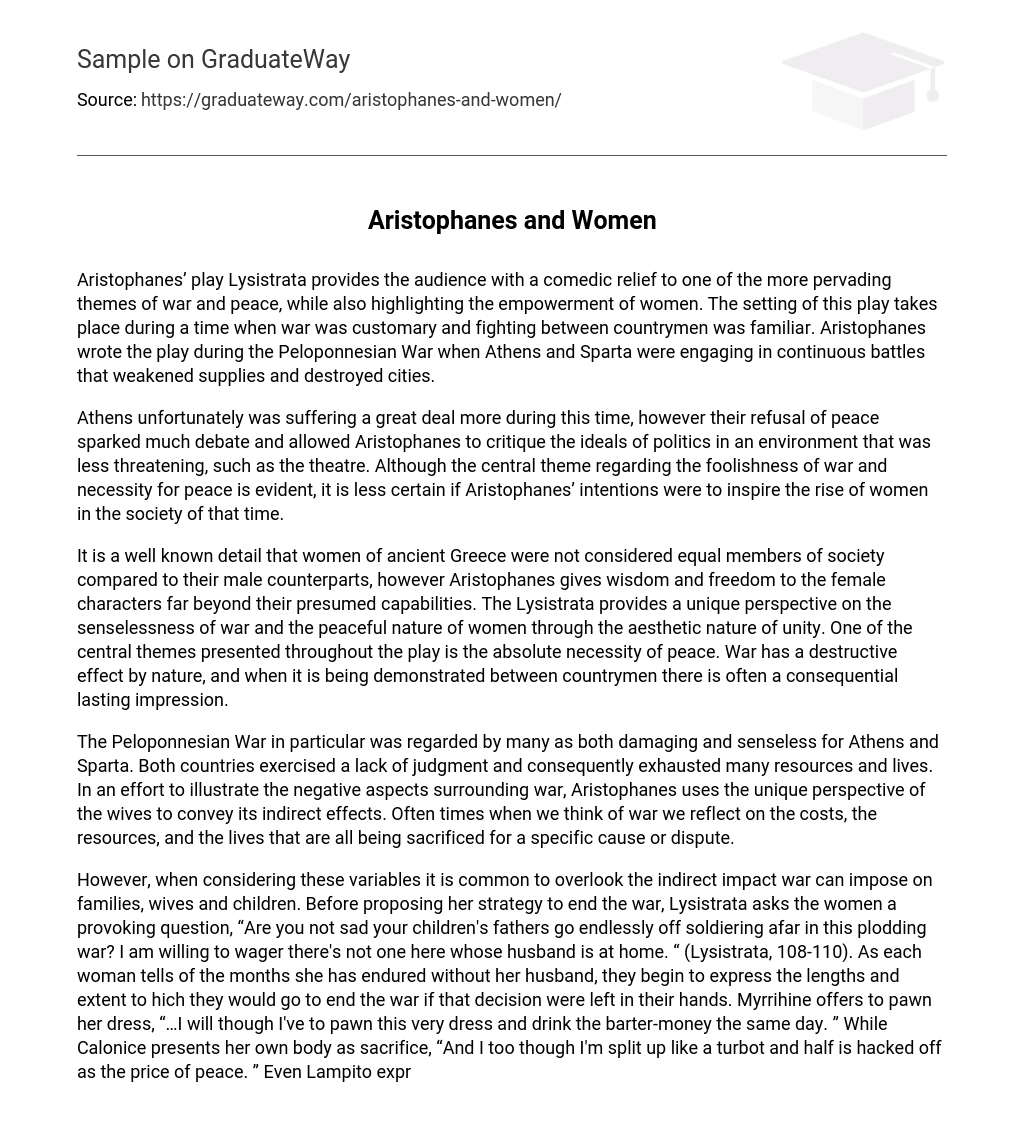Aristophanes’s play Lysistrata addresses the comedic exploration of war and peace while highlighting the empowerment of women. The play is set during the Peloponnesian War, a period characterized by frequent conflicts among citizens and dwindling supplies in ruined cities.
During this time, Athens was unfortunately experiencing a lot of suffering. Despite this, their decision to reject peace created a lot of discussion and provided Aristophanes with an opportunity to critique political ideals in a less hostile environment, like the theater. While the main theme of the foolishness of war and the importance of peace is clearly present, it is unclear whether Aristophanes intended to inspire the empowerment of women in that society.
Aristophanes defies the prevailing societal norms of ancient Greece, where women were widely considered inferior to men, by endowing his female characters with wisdom and liberty. In Lysistrata, he presents an alternative perspective that reveals the futility of war and the peaceful disposition of women through unity. Throughout this play, there is a consistent emphasis on the vital significance of peace, underscoring the inherently ruinous nature of war and its enduring adverse effects on those affected.
The negative consequences of the Peloponnesian War were perceived as detrimental and purposeless for both Athens and Sparta, leading to resource depletion and loss of lives. In order to emphasize the indirect effects of war, Aristophanes presents the viewpoint of wives. When contemplating war, our attention is typically directed towards the sacrifices made in terms of costs, resources, and lives associated with a specific cause or disagreement.
When considering various variables, it is common to overlook the indirect impact war can have on families, including wives and children. Lysistrata, before proposing her strategy to end the war, asks the women a thought-provoking question: “Are you not sad that your children’s fathers go endlessly off soldiering afar in this plodding war? I am willing to wager that there is not one here whose husband is at home.” As each woman shares the length of time she has endured without her husband, they reveal the extent to which they would go to end the war if given the decision. Myrrhine offers to pawn her dress, stating “…I will, though I have to pawn this very dress and drink the barter-money the same day.” Calonice presents her own body as a sacrifice, saying “And I too, though I’m split up like a turbot and half is hacked off as the price of peace.” Even Lampito expresses her desire for peace by saying “I’d clamber up to the tip-top of Taygetus to get a glimpse of peace.” Through these women’s expressions, it is clear that their topmost concern is a treaty for peace.
Aristophanes uses the female characters in this play to highlight the need for peace and show how war can not only divide nations but also families. Like in many other fifth century nations, Greek men were the ones who held all forms of power in society. Women were typically considered companions and were only valued for their ability to reproduce. Their role in ancient Greece was solely to fulfill traditional tasks like raising children and managing household chores. The idea of women having power or being able to organize things sensibly was seen as absurd.
Aristophanes uses his play to highlight how women, who were not considered equal to men, can rise to power by exploiting their position. In Greek society, men had control over women but lacked wisdom and reasoning when it came to the Peloponnesian War. However, women had a better understanding of the war’s senselessness and maintained their insight and peaceful nature. Aristophanes creates powerful female characters who are assertive and advocate for peace, but he achieves this by manipulating their sexual dominance.
The women not only take over the Akropolis successfully, but also come up with a plan to abstain from sexual relations with their husbands until a treaty between Athens and Sparta is established. “We must refrain from every depth of love…” (Lysistrata, 134). At first, the women are relentless, but once they realize the significant impact it could have on their men, they make a vow of abstinence. They remain in the Akropolis until their husbands start begging for their attention, and even then, they stay true to their oath until a treaty is finally made. “…Witnesses of our revelry and of the noble peace we have made, Aphrodite our aid” (Lysistrata, 1484-1485). By transcending traditional gender roles and assuming positions of authority, Aristophanes empowers the women. They employ the simplest form of female dominance to not only gain power but also initiate a treaty for a common cause. While this play encompasses various main themes, I believe Aristophanes skillfully weaves them together to convey a deeper message of strength through unity.
The idea of unity is clearly demonstrated by both the concept of peace and the newfound power exhibited by a seemingly weak group of women. The quote from Lysistrata, “Earth is delighted now, peace is the voice of Earth. Spartans, sort out your wives: Athenians, yours. Let each catch hands with his wife and dance his joy, dance out his thanks, be grateful in music, and promise reformation with his heels.” (Lysistrata, 1466-1470), highlights this unity. It is widely believed that even the weak can become strong when their cause is just, and this holds true in this particular situation. The peace that was achieved not only brought families back together, but it also united an entire nation.
Aristophanes introduces a fresh interpretation of the saying “make love, not war” in his distinctive comedic style. He employs the allure and authority of female characters to present a novel concept of their ascension to power and potentially achieving equality. Nevertheless, amidst the captivating sexual theme, the play also conveys a profound message of peace and harmony. Lysistrata, by Aristophanes, grants us a special outlook on war while underscoring the visual appeal of unity through the peaceful actions of women.
Works Cited
Aristophanes’ Lysistrata





